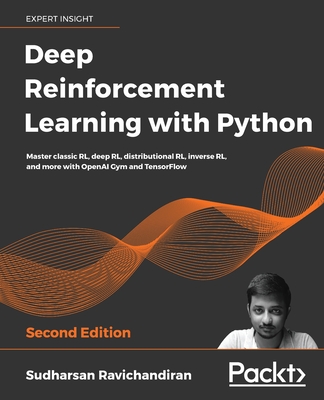Hands-On Meta Learning with Python: Meta learning using one-shot learning, MAML, Reptile, and Meta-SGD with TensorFlow (Paperback)
暫譯: 實作元學習與 Python:使用 TensorFlow 的一次性學習、MAML、Reptile 和 Meta-SGD 進行元學習 (平裝本)
Sudharsan Ravichandiran
- 出版商: Packt Publishing
- 出版日期: 2018-12-28
- 售價: $1,380
- 貴賓價: 9.5 折 $1,311
- 語言: 英文
- 頁數: 226
- 裝訂: Paperback
- ISBN: 1789534208
- ISBN-13: 9781789534207
-
相關分類:
Python、程式語言、DeepLearning、TensorFlow
-
相關翻譯:
Python 元學習 : 通用人工智能的實現 (Hands-On Meta Learning with Python: Meta learning using one-shot learning, MAML, Reptile, and Meta-SGD with TensorFlow) (簡中版)
立即出貨 (庫存=1)
買這商品的人也買了...
-
 $403自製編程語言
$403自製編程語言 -
 $403深度學習 : 21天實戰 Caffe
$403深度學習 : 21天實戰 Caffe -
 $1,617Deep Learning (Hardcover)
$1,617Deep Learning (Hardcover) -
 $1,519Fundamentals of Database Systems, 7/e (IE-Paperback)
$1,519Fundamentals of Database Systems, 7/e (IE-Paperback) -
 $2,208Deep Learning with Python: A Hands-on Introduction
$2,208Deep Learning with Python: A Hands-on Introduction -
 Python Deep Learning (Paperback)
Python Deep Learning (Paperback)$2,400$2,280 -
 TensorFlow + Keras 深度學習人工智慧實務應用
TensorFlow + Keras 深度學習人工智慧實務應用$590$460 -
 Computer Systems: A Programmer's Perspective, 3/e (IE-Paperback)
Computer Systems: A Programmer's Perspective, 3/e (IE-Paperback)$2,980$2,831 -
 $403Keras 快速上手:基於 Python 的深度學習實戰
$403Keras 快速上手:基於 Python 的深度學習實戰 -
 Concurrency in Go: Tools and Techniques for Developers (Paperback)
Concurrency in Go: Tools and Techniques for Developers (Paperback)$1,758$1,665 -
 $301精通 Python 自然語言處理 (Mastering Natural Language Processing with Python)
$301精通 Python 自然語言處理 (Mastering Natural Language Processing with Python) -
 Digital Design: With an Introduction to the Verilog HDL, VHDL, and SystemVerilog, 6/e (GE-Paperback)
Digital Design: With an Introduction to the Verilog HDL, VHDL, and SystemVerilog, 6/e (GE-Paperback)$1,380$1,352 -
 Reinforcement Learning: An Introduction, 2/e (Hardcover)
Reinforcement Learning: An Introduction, 2/e (Hardcover)$1,750$1,715 -
 $454OpenCV 3 和 Qt5 電腦視覺應用開發 (Computer Vision with OpenCV 3 and Qt5: Build visually appealing, multithreaded, cross-platform computer vision applications)
$454OpenCV 3 和 Qt5 電腦視覺應用開發 (Computer Vision with OpenCV 3 and Qt5: Build visually appealing, multithreaded, cross-platform computer vision applications) -
 圖形演算法|Apache Spark 與 Neo4j 實務範例 (Graph Algorithms)
圖形演算法|Apache Spark 與 Neo4j 實務範例 (Graph Algorithms)$580$458 -
 $602知識圖譜:概念與技術
$602知識圖譜:概念與技術 -
 TypeScript 程式設計 (Programming TypeScript)
TypeScript 程式設計 (Programming TypeScript)$580$458 -
 Hands-On One-shot Learning with Python
Hands-On One-shot Learning with Python$1,820$1,729 -
 Game Theory, 2/e (Paperback)
Game Theory, 2/e (Paperback)$3,190$3,031 -
 iOS 14 程式設計實戰 -- Swift 5.3 快速上手的開發技巧 200+
iOS 14 程式設計實戰 -- Swift 5.3 快速上手的開發技巧 200+$580$458 -
 Deep Learning 3|用 Python 進行深度學習框架的開發實作
Deep Learning 3|用 Python 進行深度學習框架的開發實作$780$616 -
 AutoML 自動化機器學習:用 AutoKeras 超輕鬆打造高效能 AI 模型 (Automated Machine Learning with AutoKeras: Deep learning made accessible for everyone with just few lines of coding)
AutoML 自動化機器學習:用 AutoKeras 超輕鬆打造高效能 AI 模型 (Automated Machine Learning with AutoKeras: Deep learning made accessible for everyone with just few lines of coding)$690$587 -
 OpenCV 影像創意邁向 AI 視覺王者歸來 (全彩印刷)
OpenCV 影像創意邁向 AI 視覺王者歸來 (全彩印刷)$890$703 -
 $458自然語言處理與醫療文本的知識抽取
$458自然語言處理與醫療文本的知識抽取 -
 LangChain 開發手冊 -- OpenAI × LCEL 表達式 × Agent 自動化流程 × RAG 擴展模型知識 × 圖形資料庫 × LangSmith 除錯工具
LangChain 開發手冊 -- OpenAI × LCEL 表達式 × Agent 自動化流程 × RAG 擴展模型知識 × 圖形資料庫 × LangSmith 除錯工具$680$537
商品描述
Explore a diverse set of meta-learning algorithms and techniques to enable human-like cognition for your machine learning models using various Python frameworks
Key Features
- Understand the foundations of meta learning algorithms
- Explore practical examples to explore various one-shot learning algorithms with its applications in TensorFlow
- Master state of the art meta learning algorithms like MAML, reptile, meta SGD
Book Description
Meta learning is an exciting research trend in machine learning, which enables a model to understand the learning process. Unlike other ML paradigms, with meta learning you can learn from small datasets faster.
Hands-On Meta Learning with Python starts by explaining the fundamentals of meta learning and helps you understand the concept of learning to learn. You will delve into various one-shot learning algorithms, like siamese, prototypical, relation and memory-augmented networks by implementing them in TensorFlow and Keras. As you make your way through the book, you will dive into state-of-the-art meta learning algorithms such as MAML, Reptile, and CAML. You will then explore how to learn quickly with Meta-SGD and discover how you can perform unsupervised learning using meta learning with CACTUs. In the concluding chapters, you will work through recent trends in meta learning such as adversarial meta learning, task agnostic meta learning, and meta imitation learning.
By the end of this book, you will be familiar with state-of-the-art meta learning algorithms and able to enable human-like cognition for your machine learning models.
What you will learn
- Understand the basics of meta learning methods, algorithms, and types
- Build voice and face recognition models using a siamese network
- Learn the prototypical network along with its variants
- Build relation networks and matching networks from scratch
- Implement MAML and Reptile algorithms from scratch in Python
- Work through imitation learning and adversarial meta learning
- Explore task agnostic meta learning and deep meta learning
Who this book is for
Hands-On Meta Learning with Python is for machine learning enthusiasts, AI researchers, and data scientists who want to explore meta learning as an advanced approach for training machine learning models. Working knowledge of machine learning concepts and Python programming is necessary.
Table of Contents
- Introduction to Meta Learning
- Face and Audio Recognition using Siamese Network
- Prototypical Network and its variants
- Building Matching and Relation Network using Tensorflow
- Memory Augmented Networks
- MAML and its variants
- Meta-SGD and Reptile ALgorithm
- Gradient Agreement as an Optimization Objective
- Recent Advancements and Next Steps
商品描述(中文翻譯)
**探索多樣的元學習演算法和技術,使用各種 Python 框架為您的機器學習模型實現類人認知**
#### 主要特點
- 理解元學習演算法的基礎
- 探索實用範例,了解各種一次性學習演算法及其在 TensorFlow 中的應用
- 精通最先進的元學習演算法,如 MAML、Reptile、Meta SGD
#### 書籍描述
元學習是機器學習中的一個令人興奮的研究趨勢,它使模型能夠理解學習過程。與其他機器學習範式不同,元學習可以讓您從小型數據集更快地學習。
《Hands-On Meta Learning with Python》首先解釋元學習的基本原理,幫助您理解學習如何學習的概念。您將深入研究各種一次性學習演算法,如 Siamese、Prototypical、Relation 和 Memory-Augmented Networks,並在 TensorFlow 和 Keras 中實現它們。在書中,您將深入了解最先進的元學習演算法,如 MAML、Reptile 和 CAML。接著,您將探索如何使用 Meta-SGD 快速學習,並發現如何使用 CACTUs 進行無監督學習。最後幾章中,您將研究元學習中的最新趨勢,如對抗性元學習、任務無關的元學習和元模仿學習。
在本書結束時,您將熟悉最先進的元學習演算法,並能為您的機器學習模型實現類人認知。
#### 您將學到什麼
- 理解元學習方法、演算法和類型的基本知識
- 使用 Siamese 網路構建語音和面部識別模型
- 學習 Prototypical 網路及其變體
- 從零開始構建 Relation 網路和 Matching 網路
- 從零開始在 Python 中實現 MAML 和 Reptile 演算法
- 研究模仿學習和對抗性元學習
- 探索任務無關的元學習和深度元學習
#### 本書適合誰
《Hands-On Meta Learning with Python》適合機器學習愛好者、AI 研究人員和數據科學家,他們希望探索元學習作為訓練機器學習模型的進階方法。需要具備機器學習概念和 Python 編程的工作知識。
#### 目錄
1. 元學習簡介
2. 使用 Siamese 網路進行面部和音頻識別
3. Prototypical 網路及其變體
4. 使用 TensorFlow 構建 Matching 和 Relation 網路
5. 記憶增強網路
6. MAML 及其變體
7. Meta-SGD 和 Reptile 演算法
8. 梯度一致性作為優化目標
9. 最近的進展和下一步計劃









